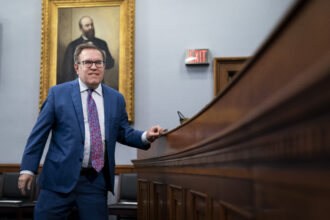With all 140 legislative seats in the state up for election, Virginia Democrats retained their majority in the state Senate and flipped the House of Delegates in Tuesday’s elections, fending off an almost-certain attempt by Republicans to roll back the state’s ambitious climate act.
“This really is a paradigm shift for us,” said Michael Town, executive director of the Virginia League of Conservation Voters. “We get to continue going forward, rather than defending [or] going backwards.”
The Democratic victory comes two years after the election of Republican Gov. Glenn Youngkin and the GOP’s takeover of the House of Delegates in 2021. Since then, Republicans have launched multiple efforts to weaken key parts of the state’s landmark Clean Economy Act and the Clean Cars Act, as well as Youngkin’s move taking Virginia out of the 11-state Regional Greenhouse Gas Initiative (RGGI).
The Clean Economy Act established a mandatory renewable energy portfolio standard and requires the decarbonization of the electric grid by 2050, and the Clean Cars Act ties Virginia’s vehicle emissions standards to those in California, which are stricter than the federal government’s. Both acts, and the initial move to join RGGI, came under the previous administration of Gov. Ralph Northam, a Democrat.
Now, with Democrats controlling the legislative process, said Connor Kisch, of Virginia’s chapter of the Sierra Club, they can refocus from protecting what already exists to pursuing new policies.
“All the progress we’ve made to lower pollution in the last few years is going to hold,” he said. “There’s a possibility that we can continue to build on some of the great work that we’ve accomplished.”
A Narrow Path Forward
Kish, Town and several other environmental leaders in the state said they are excited and optimistic about the potential for progress on climate and the environment under the new general assembly. They mentioned energy-efficiency programs and electric vehicle infrastructure as priorities. They said they also hope to see the legislature put significant effort into clean energy development, grid modernization and decarbonization.
“I think it definitely means that we’ll be able to make a little bit more progress,” said Brandy Faulkner, a professor in the political science department at Virginia Tech. “There are many people in the General Assembly … who have taken very seriously issues related to climate and environment. And their hands have been tied for the past couple of years. I think now there is a very real opportunity for their hands to be untied so that more work can get done.”
However, the election doesn’t necessarily signal a wave of sweeping climate policies.
In the Senate, Democrats kept the majority by only two seats; in the House of Delegates, the split is 51-48, with one race still too close to call. This means any climate policy will have to win the support of Youngkin, with Democrats in the legislature incapable of overriding vetoes.
“We still have divided government here,” said Russell Chisholm, managing director of Protect Our Water, Heritage, Rights (POWHR), an organization focused on environmental justice in Virginia and West Virginia, with a particular focus on fossil fuel pipelines. “Governor Youngkin is not going to sign a moratorium on fossil fuel expansions,” he said.
In fact, Youngkin’s energy plan calls for a slowdown of the transition to renewable energy, instead prioritizing an “all of the above” approach that includes natural gas.
“I don’t see a lot of common ground on environment, certainly not on climate,” said William Shobe, a professor of public policy at the University of Virginia who was involved in the original design of RGGI.
However, some environmental leaders see a narrow path forward on issues like rooftop solar, which was identified by multiple organizations as one that could have support from the governor. Offshore wind has also emerged as an issue where there is bipartisan support, with both Youngkin and environmental groups highlighting the industry in Virginia. Last week, the Biden Administration approved the Coastal Virginia Offshore Wind Project, which would be the largest offshore wind initiative in the country so far.
Kish said the Sierra Club is happy to work with the governor, but will also push legislation the group views as good for Virginia, whether or not the governor supports it. We’re “looking for ways and opportunities to work with anybody that we can, and we’re not too tied up on who that is,” he said.
“Hopefully the governor will be more willing to compromise,” said state Sen. Chap Petersen. He said so far, Youngkin has been mostly hostile to climate policy, though it was unclear if that was genuine or the byproduct of a rumored presidential run.
Petersen, a Democrat who has served in the Senate since 2008, lost his primary this spring. He was known for efforts to tackle Dominion Energy’s utility monopoly and wrangling Virginia’s initial inclusion in RGGI.
“It’s really encumbent on the governor and the leaders in the Democratic assembly to sit down on these issues and say, how do we make this work?” he said.
In a press conference Wednesday, Youngkin said he looked forward to working with the general assembly on several issues, including cost of living, tax relief, education and behavioral health.
“I look forward to working with the House and the Senate going forward just like we have, and finding these most important areas of making sure we’re reining in the cost of living, that we are providing some tax relief, that we continue to stand up for excellence in education, and safe communities, and transformation in behavioral health and a government that works for Virginians and provide services and responsiveness that reflects the fact that we work for 8.7 million bosses,” Youngkin said.
The Future of the SCC
One area where the Democrats now hold complete control is over the State Corporation Commission, or SCC, the regulatory body that oversees insurance, businesses, and—critically for the state’s climate goals—utilities. In Virginia, the dominant utilities are Dominion Energy and Appalachian Power Company.
The SCC is meant to set utility rates that are fair for both consumers and companies. It also approves or denies the utilities’ decarbonization plans, which are needed to comply with emissions reductions mandated in the Clean Economy Act.
At the moment, the SCC is not fully operational. While two members are needed for the SCC to issue rulings, only one seat on the three-person board is filled. But SCC positions are legislative appointments, meaning with Democrats in the majority, they now control who will fill the two empty positions.
“The future of the SCC is in their hands,” said Shelby Green, a researcher at the Energy and Policy Institute, a watchdog group. She noted the SCC has also been historically gutted through legislation influenced by Dominion Energy, though a bipartisan effort last legislative session returned some control to the regulators.
Dominion did not respond to a request for comment on the outcome of the elections.
A likely nominee for one of the vacant seats is Angela Navarro, who previously served on the SCC. In 2022, Republicans prevented her reappointment to the board. Both Green and Petersen expect she will be under consideration again.
Filling the SCC “should be a day-one priority,” said Kim Jemaine, policy director and state lead for Virginia at the industry group Advanced Energy United. She said the Democrats should take a hard look at the utilities and “ensure that their practices and planning align with clean energy policies” in order to encourage greater renewable investment in the state.
RGGI Remains in the Courts
With Democratic control of the general assembly, the question of Virginia’s participation in RGGI will be decided by the courts. Under RGGI’s “cap-and-invest” design, participating states set caps on emissions from their power sectors that decline each year. Power generators must buy “allowances” at periodic auctions for each ton of carbon they emit above the cap, with proceeds going to the states to assist in their transition to clean energy.
The general assembly passed a law under Northam directing the state to become part of RGGI. The legislation stipulated that the money generated through the sale of allowances be funneled into energy efficiency programs for low-income households, and flood programs. As of this summer, the program ha s generated more than $650 million for Virginia.
Keep Environmental Journalism Alive
ICN provides award-winning climate coverage free of charge and advertising. We rely on donations from readers like you to keep going.
Donate NowOne of Youngkin’s first acts upon taking office was to withdraw from RGGI through an executive order, which was then supported by a single majority vote at the Air Pollution Control Board. Youngkin said RGGI raised the cost of power for consumers.
The withdrawal is now the focus of a lawsuit brought by the Southern Environmental Law Center arguing that since Virginia joined the initiative by law, it can only be withdrawn through legislation. Since this is unlikely to occur under Democratic majorities, the state’s inclusion in RGGI now rests with the court. Hearings are scheduled for later this fall.
Faulkner, Chisholm and other leading environmentalists said they also wanted to see greater focus on environmental justice, with more being done to assist low-income and communities of color that have borne a disproportionate burden from pollution and climate change. Chisholm argued the Democratic party has a lot of work to do on this issue, and the state needs candidates who will run specifically on environmental justice.
Shobe said that with the growing problems from flooding and the increasing importance of the environment and climate change for younger voters, climate and the environment have to be priorities for the general assembly, regardless of the issues like abortion and voting rights that may have brought people to the polls.
The environment, he said, “is always there, it’s always a priority for a substantial block of Democratic voters.”











